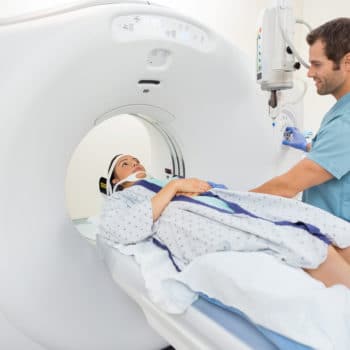Why We Love It
-
$74,990Potential Avg. Salary
-
1.4%Job Growth Rate
-
Growing DemandJob Outlook
-
Dependable Daily WorkloadCareer Attribute
A nuclear medicine technologist uses nuclear image tests, like PET and CT scans, to assist doctors in detecting and diagnosing disease in patients. Before preforming these nuclear tests, they administer radioactive therapies and pharmaceuticals into the patients bloodstream to allow them to better see the abnormally affected areas of the patients body.
Recommended Schools
What is a Nuclear Medicine Technologist?
The following responsibilities are common for Nuclear Medicine Technologists:
- Calculate, measure and record radiation dosages and radiopharmaceuticals received, used and disposed of
- Detect and map radiopharmaceuticals in patients’ bodies using a camera to produces images that are in turn interpreted by a physician
- Explain test procedures and safety precautions to patients and provide them with assistance during procedures
- Administer radiopharmaceuticals to patients to detect and treat diseases
- Properly disposes of any left over radioactive materials left from the scan or procedure
A Day In The Life
Nuclear Medical Technologists use scanning equipment and tools to create images of various areas of a patients body. They prepare radioactive drugs and administer them to the patients undergoing the tests and scans. The radioactive pharmaceutical drugs that they administer give off radiation that allows a special scanner to monitor tissues and organ functions. Areas affected will show areas of higher concentration or lower concentration of the radioactive substance. A physician or surgeon will then examine and interpret the scan images to help diagnose a patients condition.
Typical Work Schedule
Nuclear medicine technologists typically have to work full-time following the regular working schedule of 40 hours per week. However, like other healthcare workers, nuclear medicine technologists will be required to work on rotating shifts including evenings, weekends, nights and holidays. This job requires you to be on your feet for long periods of time and also to help lift or turn disabled patients which may be sometimes stressful and physically demanding. Radiation also presents hazards that should be managed using gloves and other shielding devices as well as wearing badges that measure radiation levels all the time and keeping detailed records about how much radiation you get exposed to during your career.
Projected Job Growth
There are currently around 18,500 nuclear medicine technologists working in the US. According to the Bureau of Labor Statistics, the demand for this job is expected to grow by 5% from 2019 to 2029 which is slightly faster than the average for all other occupations. Nuclear medicine was previously limited to cancer treatment using radiation, but it is currently used in a large number of diagnostic and treatment techniques. This resulted in increasing the demand for trained nuclear medicine specialists who can efficiently use and maintain these tools. They are also more trained and prepared to follow the strict precautions needed for the use of nuclear materials.
You can improve your career opportunities by completing a bachelor’s degree from an accredited program as well as earning the proper certifications in specific technologies, such as in positron emission tomography (PET), nuclear cardiology (NCT), or computed tomography (CT). These certifications can be completed from the American Registry of Radiologic Technologists and the Nuclear Medicine Technology Certification Board.
Typical Employers
The typical employers of nuclear medicine technologists include public or private hospitals. You may also work for physicians’ private offices as well as different outpatient care centers that are accredited to provide nuclear medicine services. Some may prefer to work with different medical and diagnostic labs.
Recommended Schools
How To Become a Nuclear Medicine Technologist
Aspiring nuclear medicine technologists, are encouraged to begin excelling in related coursework as early as high school. These courses include mathematics courses like calculous and science courses like physics, anatomy and physiology and biology. Also, students interested in this field should also develop related experience by volunteering or becoming interns in a hospital or healthcare setting.
If an individual wants to work in this occupation, a student must obtain a minimum of an associates degree in a related healthcare field with a certification in nuclear medicine technology. A state issued license is required to work in this profession. Certain risks are inherent with this occupation. Like all healthcare professionals, they are exposed to infectious diseases. This work also exposes individuals that work in this occupation to radiation, and one must take certain precautions and measures to protect themselves. This profession also requires that individuals be current on all their immunizations, be able to stand and walk for at least 8 hours a day, lift a 300 pound patient with assistance and move up to 45 pounds by themselves.
Nuclear Medicine Technologist Salary Data
We’ve provided you the following to learn more about this career. The salary and growth data on this page comes from recently published Bureau of Labor Statistics data while the recommendations and editorial content are based on our research.
National Anual Salary
Low Range
$62,660Average
$74,990High Range
$100,080National Hourly Wage
Low Range
$30/hrAverage
$36/hrHigh Range
$48/hrHow do Nuclear Medicine Technologist salaries stack up to other jobs across the country? Based on the latest jobs data nationwide, Nuclear Medicine Technologist's can make an average annual salary of $74,990, or $36 per hour. On the lower end, they can make $62,660 or $30 per hour, perhaps when just starting out or based on the state you live in.
Salary Rankings And Facts
#168 Nationally for All Careers
Above Average Salary Nationally
Programs and Degrees
Here are the most common degrees for becoming a Nuclear Medicine Technologist. a is usually recommended and specifically a degree or coursework that prepares you for the particular field, see below.
Highest Education Among Nuclear Medicine Technologists
- 1.8% Doctorate
- 1.9% Masters
- 22% Bachelors
- 44.3% Associates
- 21.8% College
- 7.4% High School
- 0.7% Less than High School
Job Growth Projections and Forecast
2014 Total Jobs
20,7002024 Est. Jobs
21,000Job Growth Rate
1.4%Est. New Jobs
300How does Nuclear Medicine Technologist job growth stack up to other jobs across the country? By 2024, there will be a change of 300 jobs for a total of 21,000 people employed in the career nationwide. This is a 1.4% change in growth over the next ten years, giving the career a growth rate nationwide of Above Average.
Growth Rankings And Facts
#567 Nationally for All Careers
Above Avg. Growth Nationally
What Companies Employ The Most Nuclear Medicine Technologists
| Industry | Current Jobs | New Jobs Needed | % Increase |
|---|---|---|---|
| General medical and surgical hospitals; private | 12,300 | -500 | 0% |
| Offices of physicians | 4,200 | 400 | 0% |
| General medical and surgical hospitals; local | 1,400 | -200 | 0% |














